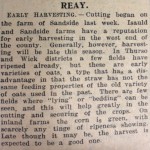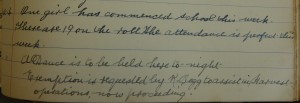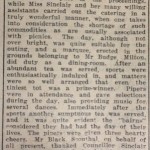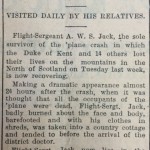In the Western Desert, Rommel’s forces continued their attempt to break through the British lines at Alam el Halfa but were driven back with heavy losses. Rommel eventually called off the attack on 5 September. In Stalingrad German ground troops entered the suburbs of the devastated city and met with fierce resistance. And on 5 August a force of combined American and Australian soldiers inflicted on the Japanese Army their first defeat on land.
 After a wet summer the Caithness harvest would be late this year. The John O’Groat Journal noted that some early harvesting had already started in Reay: “Cutting began on the farm of Sandside last week. Isauld and Sandside farms have a reputation for early harvesting in the west end of the county. Generally, however, harvesting will be late this season. In Thurso and Wick districts a few fields have ripened already, but these are early varieties of oats.”
After a wet summer the Caithness harvest would be late this year. The John O’Groat Journal noted that some early harvesting had already started in Reay: “Cutting began on the farm of Sandside last week. Isauld and Sandside farms have a reputation for early harvesting in the west end of the county. Generally, however, harvesting will be late this season. In Thurso and Wick districts a few fields have ripened already, but these are early varieties of oats.”

Schools in the county had only just reopened but already pupils were being called away to work in the fields. Gillock School log book records on 4 September: “Exemption is requested by R. Begg to assist in harvest operations now proceeding.”
Some pupils of Stemster School in Bower were also absent this week, but not because of the harvest. The log book for 31 August has the rather pathetic entry: “5 pupils absent today owing to wet day and they had no adequate footwear.”

The John O’Groat Journal this week featured some good news for the children of Halkirk. “In view of the fact that the school children of Halkirk and the surrounding district have had a rather thin time since the war as far as entertainment is concerned” Councillor Sinclair had organised a picnic for them at Milton last Saturday. “After an abundant tea was served, sports enthusiastically indulged in, and matters were so well arranged that even the tiniest tot was a prize-winner… Immediately after the sports another sumptuous tea was served, and it was quite evident the “bairns” considered they had had the day of their lives.”

Finally this week, the John O’Groat Journal reported that Flight Sergeant Jack, the sole survivor of the plane crash last week near Dunbeath that killed the Duke of Kent and fourteen other men, “now lies in the Bignold Hospital, Lybster. He occupies a private ward, and is visited daily by his relatives who rushed north immediately they learned of the discovery of the injured airman.”

The plane had been carrying explosives, though none of them went off, either in the crash or in the subsequent fire. As the paper said, “The local doctor, who was called to the scene, immediately after the ‘plane was found, showed great courage and disregard of personal danger when he went forward immediately to examine the bodies to ascertain if anyone was still alive.”
